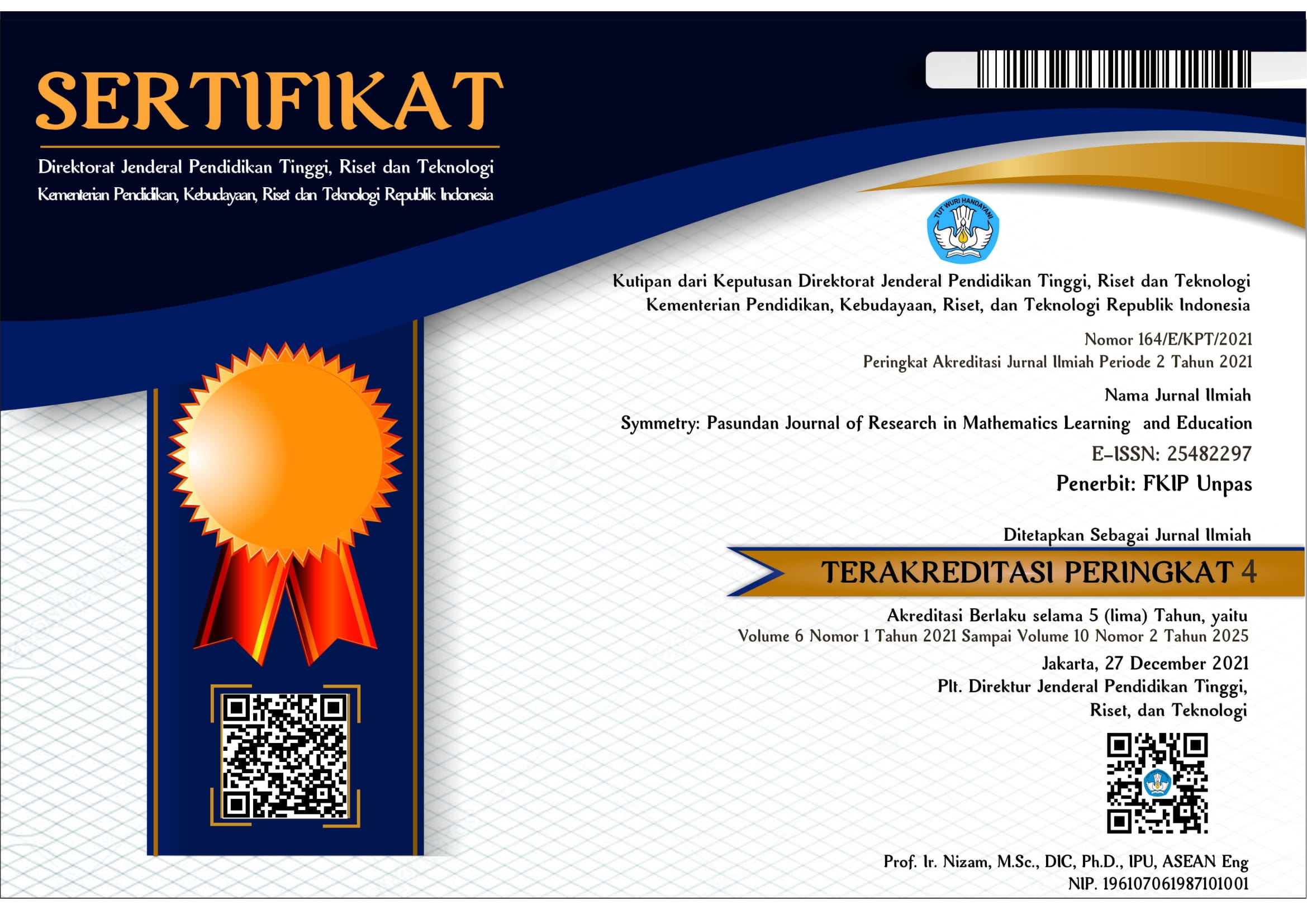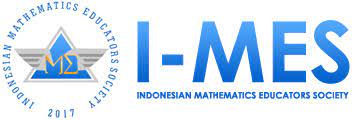ANALISIS KEMAMPUAN PEMECAHAN MASALAH MATEMATIS PADA MATERI OPERASI BILANGAN CACAH KELAS IV SD INPRES 29 KABUPATEN SORONG
DOI:
https://doi.org/10.23969/symmetry.v9i1.14361Abstract
Learners, especially at the elementary school level, must have mathematical problem solving skills. The purpose of this study is to analyse the ability of primary school learners to solve mathematical problems using the stages of Polya's Theory. This research uses a type of Concurrent Triangulation, which combines quantitative and qualitative methods when collecting data and analysing it. Interviews and written tests were used to collect data. The subjects in this study were fourth grade students of SD Inpres 29 Sorong Regency, Southwest Papua Province with a total of 22 people. The results showed that the problem solving ability of students was still in the low category with details of the acquisition of mathematical problem solving in the high category category 27.27% or 6 students, medium category 31.83% or 7 students, and low category 40.9% or 9 students. In the learning process, teaching materials are needed as well as developing strategies in the learning process that are relevant to the characteristics, environment and needs to support students' mathematical problem solving skills.
Downloads
References
Andriyani, A. (2018a). Analisis Kesalahan Siswa dalam Menyelesaikan Soal Cerita pada Materi Program Linear Ditinjau Dari Gaya Kognitif Siswa. Pendekar : Jurnal Pendidikan Berkarakter, 1(1), 16. https://doi.org/10.31764/pendekar.v1i1.252
Andriyani, A. (2018b). Analisis Kesalahan Siswa dalam Menyelesaikan Soal Cerita pada Materi Program Linear Ditinjau Dari Gaya Kognitif Siswa. Pendekar : Jurnal Pendidikan Berkarakter, 1(1), 16. https://doi.org/10.31764/pendekar.v1i1.252
Annisa, R., Roza, Y., & Maimunah, M. (2021). Analisis Kemampuan Pemecahan Masalah Matematis Siswa SMP Berdasarkan Gender. Jurnal Kependidikan: Jurnal Hasil Penelitian Dan Kajian Kepustakaan Di Bidang Pendidikan, Pengajaran Dan Pembelajaran, 7(2), 481. https://doi.org/10.33394/jk.v7i2.3688
Buranda, M. S., & Bernard, M. (2019). Analisis Kemampuan Pemecahan Masalah Matematik Materi Lingkaran Siswa SMP Berdasarkan GENDER. JPMI (Jurnal Pembelajaran Matematika Inovatif), 2(1), 33. https://doi.org/10.22460/jpmi.v2i1.p33-40
Choirudin, C., Ningsih, E. F., Anwar, M. S., Choirunnisa, A., & Maseleno, A. (2020). Developing Mathematical Students Worksheet Based On Islamic Values Using Contextual Approach. International Journal on Emerging Mathematics Education, 3(2), 152. https://doi.org/10.12928/ijeme.v3i2.13286
Christina, E. N., & Adirakasiwi, A. G. (2021). Analisis Kemampuan Pemecahan Masalah Tahapan Polya Dalam Menyelesaikan Persamaan Dan Pertidaksamaan Linear Satu Variabel. JPMI: Jurnal Pembelajaran Matematika Inovatif, 4(2).
Hafriani, H. (2021). Mengembangkan Kemampuan Dasar Matematika Siswa Berdasarkan NCTM Melalui Tugas Terstruktur Dengan Menggunakan ICT (Developing The Basic Abilities of Mathematics Students Based on NCTM Through Structured Tasks Using ICT). JURNAL ILMIAH DIDAKTIKA: Media Ilmiah Pendidikan Dan Pengajaran, 22(1), 63. https://doi.org/10.22373/jid.v22i1.7974
Hidayat, R., & Evendi, E. (2022). The Intervention of Mathematical Problem-Solving Model on the Systems of Linear Equation Material: Analysing its Impact on Increasing Students’ Creative Thinking. International Journal of Essential Competencies in Education, 1(2), 61–68. https://doi.org/10.36312/ijece.v1i2.1069
Lubis, M. S. (2016). Teori Belajar dan Pembelajaran Matematika. In Universitas Islam Negeri Sumatera Utara (Issue April).
Masfufah, R., & Afriansyah, E. A. (2021). Analisis Kemampuan Literasi Matematis Siswa melalui Soal PISA. Mosharafa: Jurnal Pendidikan Matematika, 10(2). https://doi.org/10.31980/mosharafa.v10i2.825
Moleong. (2019). Analisis data kualitatif. In Alhadharah: Jurnal Ilmu Dakwah (Vol. 17, Issue 33).
Permendikbudristek, Peraturan Menteri Pendidikan, Kebudayaan, Riset, dan Teknologi (2022).
Polya, g. (2004). How to solve it: A new aspect of mathematical method (Vol. 85). Princeton university press.
Polya, G. (1978). How to solve it: a new aspect of mathematical method second edition. In Princeton University Press: United States of America (Vol. 2).
Ramadhani, R. (2018). The enhancement of mathematical problem solving ability and self-confidence of students through problem based learning. Jurnal Riset Pendidikan Matematika, 5(1), 127–134. https://doi.org/10.21831/jrpm.v5i1.13269
Rianto, H., & Santoso, R. H. (2014). Pengaruh Pembelajaran Inquiry dan Problem Solving terhadap Motivasi dan Prestasi Belajar Matematika. PYTHAGORAS Jurnal Pendidikan Matematika, 9(1), 1–10. https://doi.org/10.21831/pg.v9i1.9055
Riyadi, R., Syarifah, T. J., & Nikmaturrohmah, P. (2021). Profile of Students’ Problem-Solving Skills Viewed from Polya’s Four-Steps Approach and Elementary School Students. European Journal of Educational Research, volume-10-2021(volume-10-issue-4-october-2021), 1625–1638. https://doi.org/10.12973/eu-jer.10.4.1625
Sahir, S. H. (2022). METODOLOGI PENELITIAN. In Jurnal Ilmu Pendidikan (Vol. 7, Issue 2).
Shah, K., Syarifuddin, A., Hamzah, A., & Handayani, T. (2023). Analisis Kesulitan Belajar Matematika Materi Operasi Bilangan Bulat Pada Siswa Sekolah Dasar. JUDIKDAS: Jurnal Ilmu Pendidikan Dasar Indonesia, 2(3). https://doi.org/10.51574/judikdas.v2i3.799
Sriwahyuni, K., & Maryati, I. (2022). Kemampuan Pemecahan Masalah Matematis Siswa pada Materi Statistika. Plusminus: Jurnal Pendidikan Matematika, 2(2). https://doi.org/10.31980/plusminus.v2i2.1830
Sugiono. (2018). Metode Penelitian Pendidikan Pendekatan Kuantitatif, Kualitatif, dan R&D. In ALFABET, cv.
Sutarto, H. (2017). Pendidikan Matematika Realistik Teori,Pengembangan dan Implementasinya. In Jakarta : PT Raja Grafindo Persada (Vol. 15, Issue 7).
Syafri, M., Zulkarnain, Z., & Maimunah, M. (2020). The Effect of SSCS Learning Model on the Mathematical Problem Solving Ability of Junior High School Students, Kampar Regency. Journal of Educational Sciences, 4(2), 309. https://doi.org/10.31258/jes.4.2.p.309-317
Thanheiser, E. (2023). What is the Mathematics in Mathematics Education? Journal of Mathematical Behavior, 70. https://doi.org/10.1016/j.jmathb.2023.101033
Downloads
Published
Issue
Section
License
Copyright (c) 2024 Symmetry: Pasundan Journal of Research in Mathematics Learning and Education

This work is licensed under a Creative Commons Attribution 4.0 International License.
Hak Cipta sepenuhnya ditangan jurnal.



















